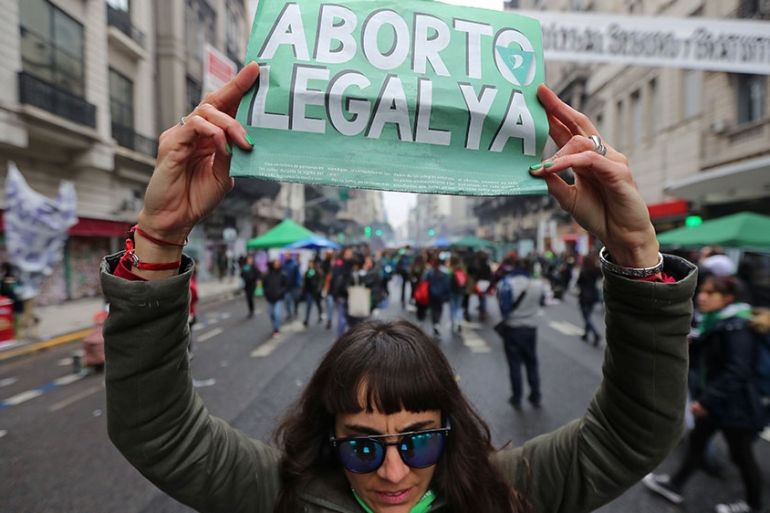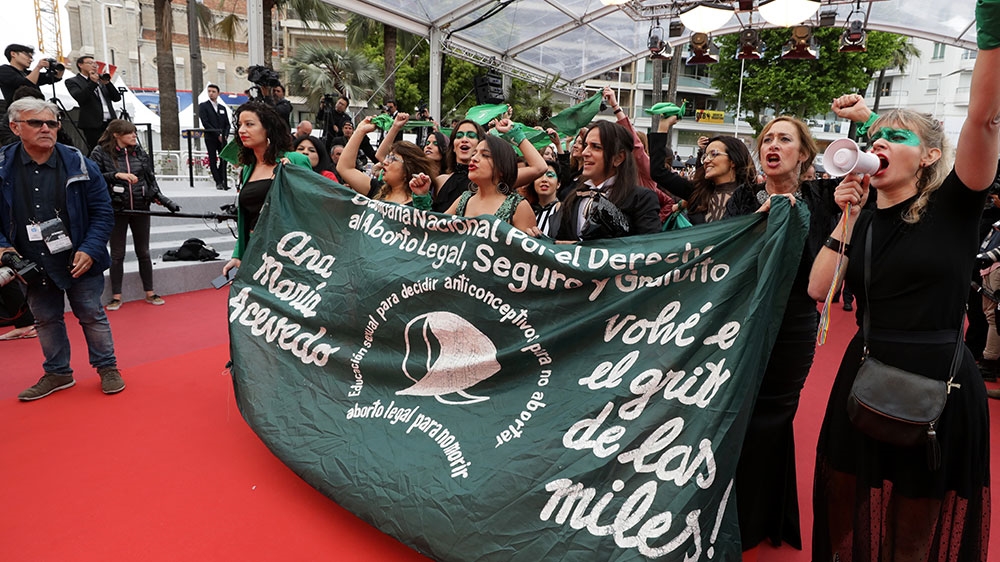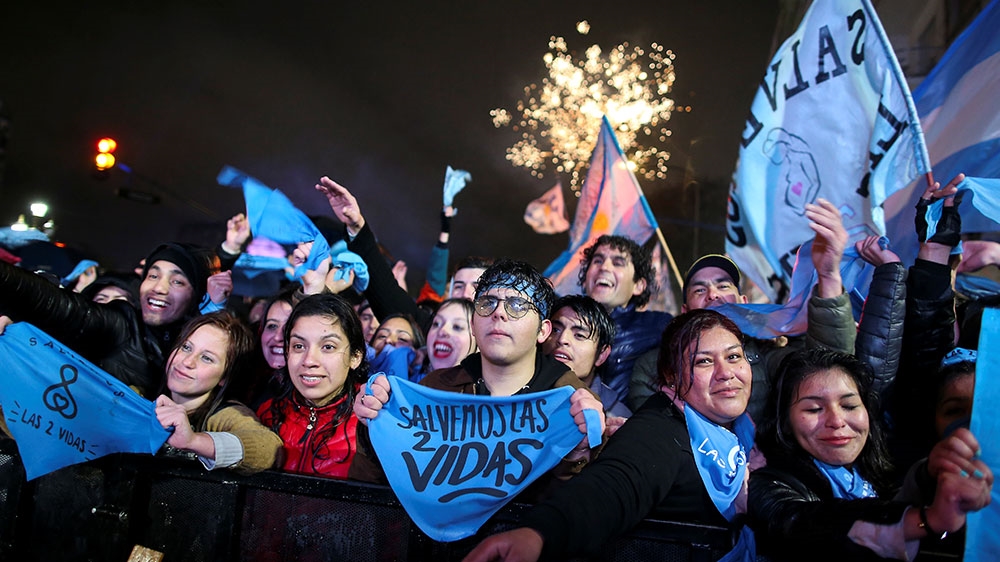Argentina activists to introduce new bill to legalise abortion
New legislation comes after similar bill passed in the lower house of Congress, but failed in the Senate last year.

Buenos Aires, Argentina – On every Tuesday for more than a year, Monica Menini has headed to a central square in the northern Argentine city of Salta.
There, Menini and other activists and lawyers set up a table, neatly arrange pamphlets decorated in green and unfurl a banner with messages related to a powerful campaign to legalise abortion.
Keep reading
list of 4 itemsTop New York court overturns Harvey Weinstein’s 2020 rape conviction
Cass Review: Feminists accused of being ‘unkind’ have been vindicated
Ten years after Chibok girls kidnapping: One woman’s struggle to move on
Sometimes the group is met by anti-abortion rights campaigners, who set up competing demonstrations, reciting prayers, tossing holy water at them and carrying giant affiches of fetuses. On a Tuesday in April, pairs of teenage girls, dressed in high school uniforms, approached their table, hoping to acquire a new status symbol: the green handkerchief, emblematic of the campaign to legalise abortion in the country.
This Tuesday, Menini, who describes herself as a feminist lawyer, will join thousands of women across the country celebrating new legislation that is expected to be introduced in the national Congress that seeks to legalise abortion in Argentina.
The new legislation is similar to a proposal introduced last year that made it past the lower House of Deputies but failed in the Senate.
“It’s not that [this project] is stronger, but it has been improved, because we are always improving,” said Menini, a member of the commission that drafted the proposal.
This year’s legislation proposes that “women or other identities with the ability to gestate” have access to legal, safe, publicly-funded abortions in the first 14 weeks of pregnancy. It also seeks to decriminalise the termination of a pregnancy, which can currently land a woman in jail, and it does not allow for a medical practitioner to declare a conscientious objection to the process. Abortions in Argentina’s legislative language are referred to as “the legal interruption of a pregnancy”. They have only been legal in the case of rape or if the mother’s health is at risk since 1921.

The new project was drafted by law, health, and political experts before circulating around Argentina, giving people working at the grassroots a chance to offer input. It was voted on in March by feminist representatives. If approved by politicians, Argentina would become the most populous country to legalise abortion in Latin America, a region with strict anti-abortion rights laws rooted in Catholic doctrine.
Part of the national conversation
Although it’s too early to say whether this new proposal will make it to a vote in Congress, the issue that was propelled into the public arena with the rise of the Ni Una Menos (Not One Less) movement continues to be as visible and potent as ever.
It is the first time, for example, that candidates in a presidential election are being asked about their stance on abortion. The issue made headlines at the Cannes Film Festival earlier this month when it screened a documentary about the campaign, and a new viral video released on the weekend by an activist group of Argentine actresses declared that “clandestine abortions are violence committed by the state”. It was viewed more than 400,000 times on Instagram.

For legalisation campaigners, the issue remains one of health, and a woman’s autonomy over her body. Last year, Health Minister Adolfo Rubinstein estimated that more than 350,000 clandestine abortions occur in the country every year. He said legalising it would save preventable deaths, especially those of young women, in precarious economic conditions. Human rights groups estimate that the number of illegal abortions may be as high as 500,000. Researchers have said that about 18 percent of maternal deaths in Argentina are linked to complications with unsafe procedures.
Eugenia Monte, a lawyer for the organisation Catholics for the Right to Decide, said not only is the current law not dissuading the practice, but the state has also demonstrated it is either not interested, or not capable, of prosecuting people who obtain illegal abortions.
“That means that criminalising abortion is only performing a symbolic function at this point, harshly stigmatising people who choose to abort,” Monte said, and in so doing leading women to make risky choices that could jeopardise their health.
“We know that clandestine abortions are being performed on a massive scale in Argentina,” she told Al Jazeera.
The past year has also exposed the unequal way in which existing laws are being enforced. The story of an 11-year-old girl who had been raped by her grandmother’s boyfriend and then denied a legal abortion by officials in the northern province of Tucuman sparked outrage earlier this year, and highlighted the power of the Catholic Church, which publicly appealed to save the life of the girl and the fetus. The doctors who performed an emergency procedure to deliver the baby prematurely are now being prosecuted.
In another case, a doctor in the province of Rio Negro was found guilty of failing to fulfil his duty as a civil servant because he intervened to stop a legal abortion of a 19-year-old woman, who was more than five months pregnant and had been raped. Following the judgement last week, Dr Leandro Rodriguez Lastra told local media that he felt “deceived” by the judicial system, and that he planned to appeal the decision.
Doctors, in solidarity with Lastra, registered as conscientious objectors, leaving an area of the province without medical professionals who would perform the procedures in a publicly-funded hospital. There are also provinces that have used legislative and judicial levers to block access to abortions that the law currently says are legal. In the province of Cordoba, a Catholic pro-abortion rights group is seeking to bring the existing legislation back before the Supreme Court of the nation, vowing that it will “fight to enforce the right of a child to live, from the time of conception”.
‘A failure on the part of society’
That sentiment was echoed by anti-abortion rights groups that are gearing up to oppose the new project. June 8 has been set aside as a day for demonstrations for the “blue handkerchiefs”, the colour claimed by the anti-abortion rights movement.
Ana Belen Marmora, who describes herself as a pro-abortion rights lawyer, activist and journalist, said that Argentina should be addressing the real issues that jeopardise the health of women, such as poor healthcare, lack of quality education, unemployment and insecurity.
Marmora, who is a member of the youth organisation FrenteJoven, said the pro-abortion rights campaign has awakened a vocal opposition among young people, who want to defend “both lives”.
“We don’t want to be part of a culture of disposal, or adopt ideologies that come from other countries and change the way our laws work and how we think as a society,” she said. “Abortion is a failure on the part of the society and the state, that couldn’t find a solution, and instead resorted to patchwork. No woman wants to have an abortion.”

She highlighted the case of Lastra, and the response of doctors, as especially troubling and indicative of a larger problem.
“They are conscientious objectors because they are being persecuted,” she said. “It’s crazy that doctors are afraid and don’t know what to do.”
Menini, for her part, doesn’t believe the opposition to abortion is growing in Argentina, but she does think that movement is attracting more money, and support from international organisations.
“But it isn’t getting stronger in people’s imagination,” said Menini, who noted that the public taboo around the topic is lifting, with women speaking openly about the abortions they carried out in secret. “We’re winning that part,” she said.